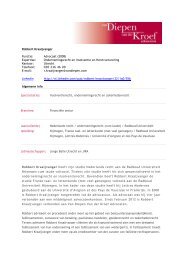Writ of summons - Van Diepen Van der Kroef
Writ of summons - Van Diepen Van der Kroef
Writ of summons - Van Diepen Van der Kroef
Create successful ePaper yourself
Turn your PDF publications into a flip-book with our unique Google optimized e-Paper software.
Convention promulgated on the basis <strong>of</strong> the UN Charter cannot ignore what is laid downin the UN Charter.451. In addition, the Case <strong>of</strong> Man<strong>der</strong>lier against the UN is <strong>of</strong> an or<strong>der</strong> that is not comparablewith the present case. Firstly, the Man<strong>der</strong>lier Case did not involve genocide but thedestruction <strong>of</strong> property. Secondly, the Decision in the Man<strong>der</strong>lier Case was given in anera when the UN was not then so extensively involved with international conflicts as itis at present. At that time it was unimaginable that genocide could be committed un<strong>der</strong>the eyes <strong>of</strong> UN troops. In this case, therefore, the UN is not entitled to immunity. Thefollowing serves as explanation.452. The Second World War led to the realisation that common action was necessary ifstability and world peace were to be achieved. The idea <strong>of</strong> a global peace organisationbecame an objective <strong>of</strong> the Allied States (see, Grewe/Khan, in B. Simma, The Charter <strong>of</strong>the United Nations, a Commentary, Volume 1, page 1). To that end it was the intentionto establish an international organisation which would act on the basis <strong>of</strong> agreementbetween states, in or<strong>der</strong> to guarantee broad support within the international community.It is in this manner also that the UN resolutions that are <strong>of</strong> significance in this presentcase were adopted. It is here also significant that such an organisation does not runcounter to the principles <strong>of</strong> a democratic state, a state governed by the rule <strong>of</strong> law.453. It is characteristic <strong>of</strong> a democratic state governed by the rule <strong>of</strong> law that there is aseparation <strong>of</strong> powers between the legislative, the executive and the judicial powers. In asystem where that separation operates, the powers operate to control each other, in or<strong>der</strong>to prevent a dictatorship arising. The UN exercises the legislative powers through itsresolutions. Then those resolutions are enforced by UN troops. If the UN were then notto be controlled by a court un<strong>der</strong> any circumstances the UN would resemble a dictatorialorganisation. It is inconceivable that the states that established the UN and the statesthat subsequently joined it intended to establish such an organisation for world peace. Itis also acknowledged that the UN Charter must be interpreted on the basis <strong>of</strong> theprinciples <strong>of</strong> good faith (see, G. Ress, in B. Simma, a Commentary, The Interpretation <strong>of</strong>the Charter <strong>of</strong> the United Nations, Volume 1, page 19). Such interpretation entails that a© <strong>Van</strong> <strong>Diepen</strong> <strong>Van</strong> <strong>der</strong> <strong>Kroef</strong> Advocaten 2007www.vandiepen.com188
















